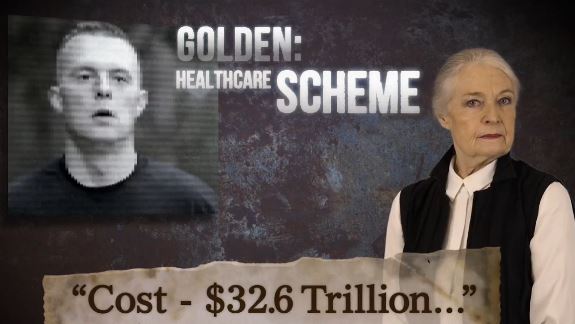And so it begins.
U.S. Rep. Bruce Poliquin’s campaign issued its first television advertisement Friday assailing his chief opponent, Democrat Jared Golden, as “too radical” and “too risky.”
The move drew a quick denunciation from Golden’s camp.
“Today’s desperate attack by Bruce Poliquin comes as no surprise and validates everything the polls show: The two-term congressman is in serious trouble,” Jon Breed, Golden’s campaign manager, said in a prepared statement.
After a brief picture of Poliquin, the ad opens with a black-and-white shot of Golden jogging through a wooded area and wearing a T-shirt that says, “Pain is Weakness Leaving the Body.”
Then it cites him as a “radical, liberal politician” as it displays a picture of his face looking rather like a cyborg.
It proceeds to claim Golden backs “a risky scheme to end Medicare as we know it, claiming it will cost $32 trillion,” as an older woman shakes her head sadly.
Golden is among the many Democrats who have expressed support for Medicare-for-All. Its likely price tag is about what Poliquin’s ad says, a number of studies have shown.
Fact checkers generally agree, though, that the proposal would not change Medicare. It merely would expand the eligibility for it to those younger than 65.
Brendan Conley, a spokesman for the Poliquin campaign, said Medicare “is designed as a program for seniors. Jared Golden’s risky scheme to alter Medicare is radical and endangers the program, which should be reserved for our seniors.”
The $32 trillion price tag emerged from studies, including one from the left-leaning Urban Institute, which looked at a version of the idea put forth by U.S. Sen. Bernie Sanders, a Vermont independent who ran a surprisingly strong but ultimately unsuccessful presidential race in the 2016 primary.
Sanders’ plan would cost $32 trillion over the course of a decade, a Mercatus Center study found, a price tag so high that even if the federal government doubled the individual and corporate taxes it collects each year, it wouldn’t have enough to fund the program envisioned by Sanders.
However, as Sanders pointed out, there is a flip side, because putting health care almost entirely in federal hands would save trillions of dollars for the people and companies that pay its cost now.
Even so, Kenneth Thorpe, a health policy professor at Emory University in Atlanta and a senior health policy adviser in the Clinton administration, told Time that many people would see their tax bills increase more than their health care premiums would decrease.
Vox said, however, that “when you consider a universal single-payer program” such as Medicare-for-All would “cover every single American, eliminating uninsurance” and also “provide much more robust benefits, covering more services than get covered right now,” then a price tag that roughly matches what the nation spends today, the idea “starts to look like a good deal.”
Golden said recently he figures it might be possible to expand Medicare incrementally to offer older workers who aren’t quite retirement age the chance to get the coverage that many of them need.
“We can start by improving the Affordable Care Act,” Golden said on his campaign website. “From there, we need to move towards a universal health care system, like Medicare-for-All.”
Breed said, “Poliquin’s decision to attack a T-shirt, rather than point to any of his own accomplishments, shows just how bad things are for the congressman.”
Poliquin’s vote last year to repeal the Affordable Care Act is among the issues that Democrats are trying to hammer him with because it would have stripped tens of thousands of Mainers of their health insurance had U.S. Sen. Susan Collins of Maine not helped block the move in the Senate.
Breed said the reality is that “the man behind the T-shirt is Jared Golden, a U.S. Marine who led troops in combat, and then worked in the Maine Legislature to make sure veterans received better care when they came home.”
He said Golden wants to serve in the House “to protect Medicare and Social Security from Washington politicians like Bruce Poliquin.”
Poliquin has been running ads on the radio for about a month. This is his first foray into television, but it won’t be the last.
Poliquin’s campaign treasury had $2.7 million in its coffers at the end of June, compared to $357,000 for Golden, who spent more than $800,000 to win a Democratic primary in June.
Outside groups already have spent more than $1 million on the race. Some of those spots have lashed at Poliquin, but the Golden campaign has not aired any itself.
University of Maine at Farmington political science professor James Melcher said Friday he suspects the 2nd District again will wind up with one of the most costly congressional races in the country.
“There are going to be a lot of advertisements,” he said, as both sides try to get their message out by Election Day.
Send questions/comments to the editors.



Comments are no longer available on this story